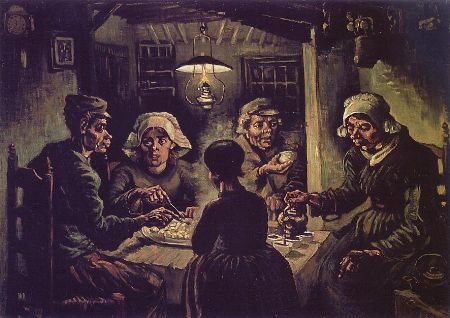by Larry
June, 2013Explorers Sailed for Spices, Settled for SpudsGiven the same amount of labor, energy, and land under cultivation, tubers are much better at providing edible calories than rice or wheat. Thus, after potatoes were discovered in Peru and disseminated in Europe by the late 1500s, leaders recognized the advantages of getting their people to try, like, and grow this new foodstuff. So successful were their marketing efforts that researchers credit the advent of potato farming in Europe with the end of famine there, at least until a potato blight in the 19th Century led to over a million Irish dying of starvation and more than two million immigrating, most to America. With food for their growing populations assured, European nations came to dominate much of the world between the mid-18th and mid-20th Centuries. Associated developments during that period led as well to the independence, rapid growth, and eventual economic and military power of the USA.
The modern era owes at least as much to the lowly spud. Industrial scale agriculture began with monoculture farming of potato plants, later augmented with heavy fertilizing, first with bird droppings or guano from Peru, later with products made with atmospheric nitrogen. Colorado potato beetles and fungal blight proved to be scourges to European spud production, so farmers began using pesticides. These three factors, monoculture farming, intensive fertilizing, and the routine application of pesticides, for better or worse, are the hallmarks of the Green Revolution which brings in billions for agri-business around the world and feeds several extra billions of people as the world's population keeps expanding. Many tend to think of potatoes as large, white on the inside, and brown, rough-skinned on the outside. These so-called Idaho or Irish potatoes are the ones from which we often get French fries, potato chips, and baked potatoes. Yet potato tubers come in numerous forms and in fact, besides the commonly recognized white potatoes, red potatoes, and yams (or sweet potatoes, which are, however, not true potatoes), there have been nearly 5000 varieties cultivated by Andean Indian cultures. Many are naturally more flavorful and disease-resistant than the bland potatoes spread from clones that would come to dominate Europe, the US, and, via junk food franchises and companies like McDonalds, eventually much of the world. Yet the latter, less diverse varieties doubled Europe's food supply after introduced there in the late 1500s. And they have become globally the fifth most important food source, after rice, wheat, corn, and sugarcane. Scores of foods are now made from or with potatoes, including starch, pancakes, potato chips and wedges, French fries, patties, baked spuds, casseroles, potatoes au gratin, BBQ potatoes, hash browns, roasted spuds, varieties of soft taquitos and tacos, etc. There are even plastic products made from potatoes. Along with everything else, spuds are a fundamental basis of the typical male American's meat and potatoes diet and of the traditional patio grilling hobby. Add in Schnapps or vodka, the Russian drink made from potatoes, and these tubers can be said to amply justify their big-agro existences! And let us not forget that from potatoes we also get "Spud, the beer brewed for people who can't taste the difference!" (Thanks, "Saturday Night Live!") Primary Source: How the Potato Changed the World. Charles C. Mann in Smithsonian magazine; November, 2011. |
